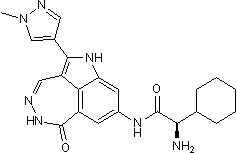Resistance to TKIs in leukemia patients presents a significant clinical challenge. As small numbers of leukemia cells have been observed to persist in the bone marrow of TKI-treated patients, despite rapid and ALK5 Inhibitor II ALK inhibitor dramatic clearance of peripheral blood blasts, there is growing interest in determining the role of the bone marrow microenvironment in the long-term survival of leukemic stem cells. Indeed, the number of existing leukemic stem cells that exhibit high survival ability on bone marrow stromal layers has proven to be a significant prognostic indicator. Of relevance, we have found that media conditioned by human HS-5 stromal cells, as well as a cocktail of cytokines secreted in high concentrations by HS-5 stroma, were able to partially protect TKItreated chronic myeloid leukemia cells and AML cells. A subset of AML cells expresses a mutated form of the class III receptor tyrosine kinase FLT3, which has inspired the development of a number of small molecule inhibitors of mutant FLT3. However, FLT3 inhibitors tested thus far, including PKC412, which is in late stage clinical trials, and the highly potent and selective FLT3 inhibitor, AC220, which is in early phase clinical trials, generally at best induce partial and transient clinical responses in patients when used alone. In addition, we have found that bone marrow-derived stroma diminishes the activity of both PKC412 and AC220. There is thus a need for identification and development of novel therapies that can be effectively combined with TKIs to delay or suppress leukemia progression, override stroma-associated drug resistance, and increase patient survival. We have recently identified the multi-targeted kinase inhibitor, dasatinib, and dasatinib-like compounds as being able to potentiate the activity of TKIs PKC412 and AC220 against mutant FLT3-expressing cells cultured in the presence of cytoprotective and cytokine-abundant stromal-conditioned media by performing a combinatorial  drug screen using the KIN001 library. Our study also highlighted the potential of Jak inhibitors to synergize with PKC412 and AC220 as well as enhance their apoptotic activity against mutant FLT3-expressing cells cultured in the presence of SCM. While the significance of stromal-derived growth factors in viability enhancement and cytoprotection of leukemic stem cells cannot be denied, not all hematologic malignancies can be rescued from programmed cell death by secreted cytokines in the absence of direct communication with the stromal cells themselves. As examples, protection of AML cells and B-lineage ALL cells from spontaneous and/or drug-induced apoptosis was observed to depend on direct bone marrow fibroblast cell:leukemic cell interaction. Similarly, protection of CLL cells from apoptosis depends on adherence of these cells to bone marrow stromal layers, and adhesion between bone marrow stroma and myeloma cells is necessary for protection of these cells from drug-induced apoptosis. Thus, the direct interaction between stromal cells and leukemic cells is important to fully GSK212 understand the mechanisms driving stromal-mediated chemoresistance, as well as for identification of integral signaling molecules as potential therapeutic targets for overriding drug resistance. To address this, we used an adherent stroma-based co-culture system, as opposed to the SCM-based system used previously, as the basis for a combinatorial drug screen designed to identify novel kinase inhibitors able to potentiate the apoptosis-inducing effects of PKC412 against adherent stroma-protected mutant FLT3positive cells. In parallel to the KIN001 kinase inhibitor library, we also screened the LINCS kinase inhibitor library, which is composed of inhibitors characterized as being relatively potent and selective toward a limited range of kinase targets. Here, we identified selective Akt inhibitors, such as MK2206, as able to effectively combine with FLT3 inhibitors, including PKC412 and AC220, against mutant FLT3-expressing cell lines or primary AML cells cultured in a cytoprotective stromal environment.
drug screen using the KIN001 library. Our study also highlighted the potential of Jak inhibitors to synergize with PKC412 and AC220 as well as enhance their apoptotic activity against mutant FLT3-expressing cells cultured in the presence of SCM. While the significance of stromal-derived growth factors in viability enhancement and cytoprotection of leukemic stem cells cannot be denied, not all hematologic malignancies can be rescued from programmed cell death by secreted cytokines in the absence of direct communication with the stromal cells themselves. As examples, protection of AML cells and B-lineage ALL cells from spontaneous and/or drug-induced apoptosis was observed to depend on direct bone marrow fibroblast cell:leukemic cell interaction. Similarly, protection of CLL cells from apoptosis depends on adherence of these cells to bone marrow stromal layers, and adhesion between bone marrow stroma and myeloma cells is necessary for protection of these cells from drug-induced apoptosis. Thus, the direct interaction between stromal cells and leukemic cells is important to fully GSK212 understand the mechanisms driving stromal-mediated chemoresistance, as well as for identification of integral signaling molecules as potential therapeutic targets for overriding drug resistance. To address this, we used an adherent stroma-based co-culture system, as opposed to the SCM-based system used previously, as the basis for a combinatorial drug screen designed to identify novel kinase inhibitors able to potentiate the apoptosis-inducing effects of PKC412 against adherent stroma-protected mutant FLT3positive cells. In parallel to the KIN001 kinase inhibitor library, we also screened the LINCS kinase inhibitor library, which is composed of inhibitors characterized as being relatively potent and selective toward a limited range of kinase targets. Here, we identified selective Akt inhibitors, such as MK2206, as able to effectively combine with FLT3 inhibitors, including PKC412 and AC220, against mutant FLT3-expressing cell lines or primary AML cells cultured in a cytoprotective stromal environment.
This synergy occurs both in the absence as well as the presence of stroma or stromal-derived cytokines
Leave a reply